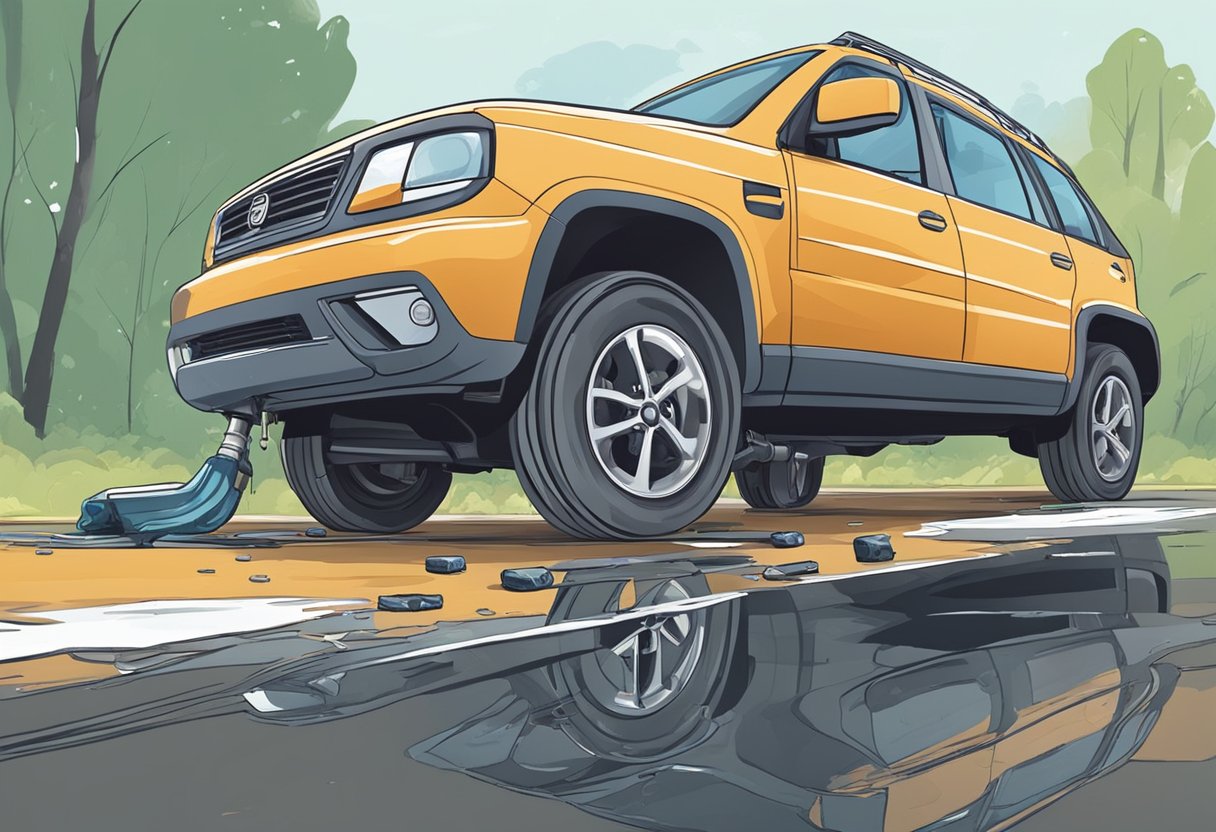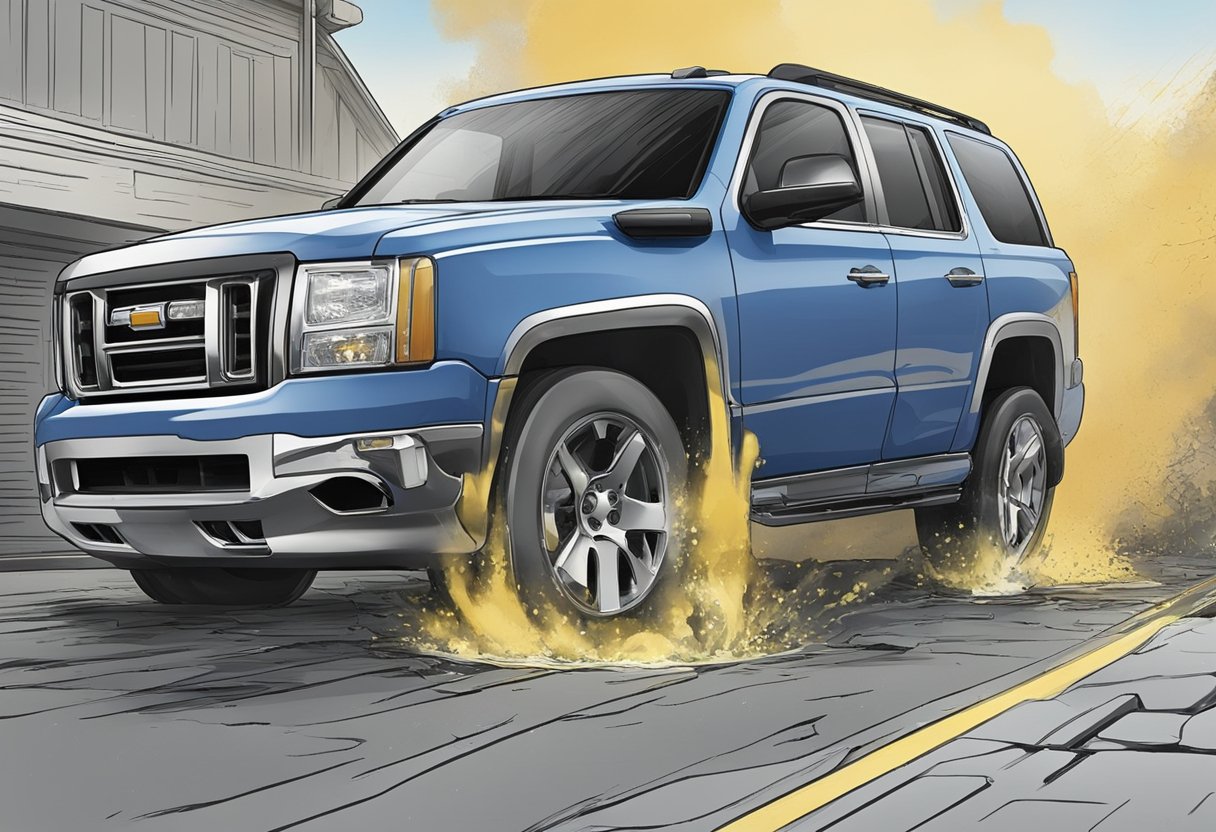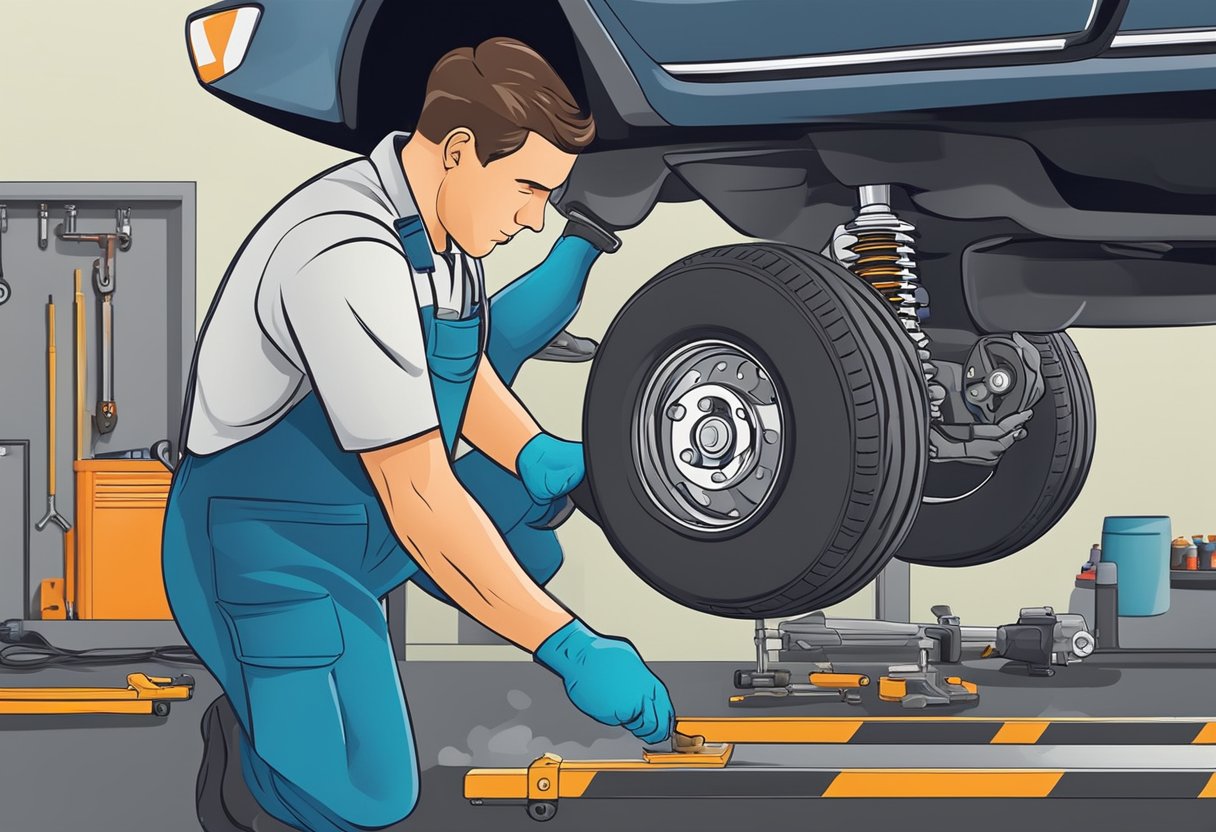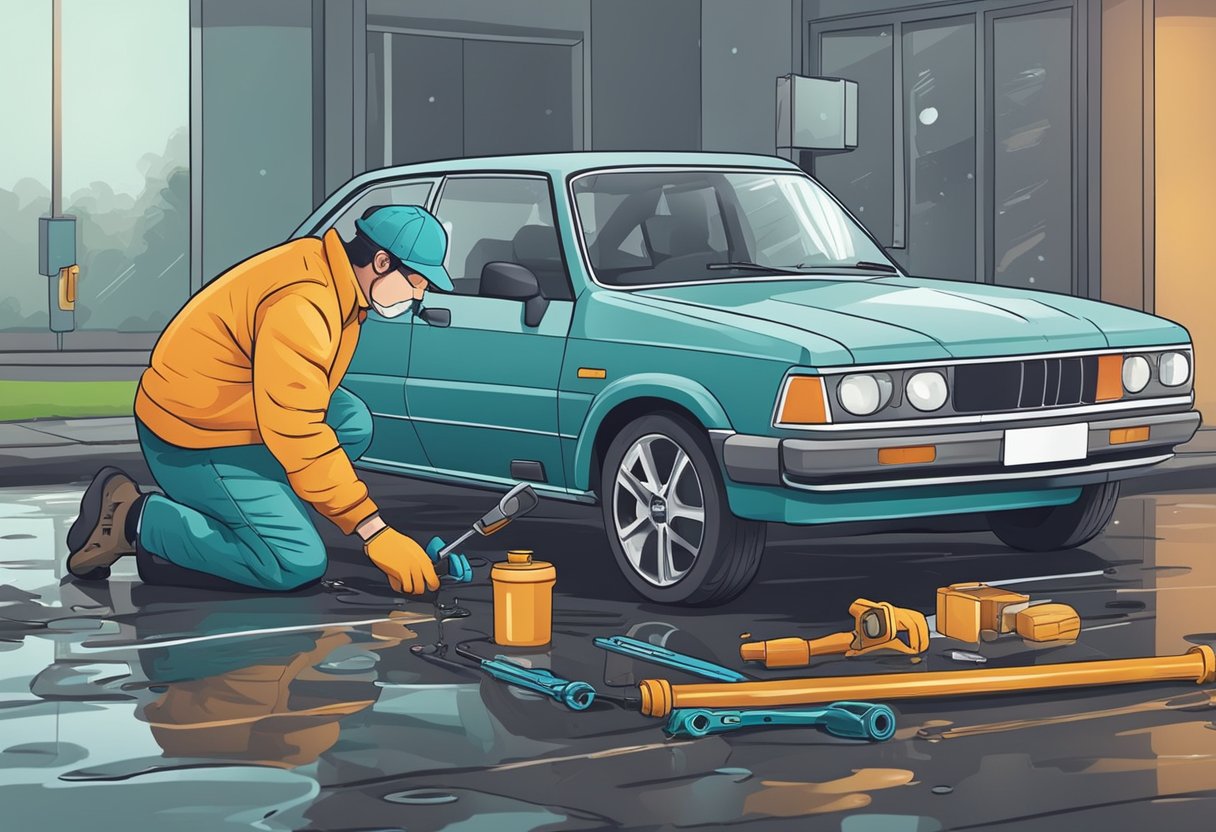If you’re experiencing a bumpy ride, it could be due to leaking shocks. Shock absorbers are an essential part of your vehicle’s suspension system, responsible for reducing the impact of bumps and vibrations on the road. When these shocks start to leak, it can cause a range of problems, from poor handling and performance to safety concerns.
Leaking shocks can be caused by a variety of factors, including regular wear and tear, damaged piston shafts, worn chrome coating, oil mist residue, and bad shock seals. If you notice any fluid leaking from your shocks or a bouncy ride, it’s essential to address the issue promptly to prevent further damage to your vehicle’s suspension system. In this article, we’ll discuss the causes of leaking shocks and explore potential solutions to help you get back to a smooth and safe ride.
Understanding Shock Absorbers and Suspension
If you want to understand why your shocks are leaking, you need to understand the basics of how shock absorbers work and their role in your vehicle’s suspension system.
Components of a Shock Absorber
A shock absorber, commonly known as a shock, is a critical component of your vehicle’s suspension system. It is designed to absorb and dampen the impact of bumps and vibrations on the road, ensuring a smooth and comfortable ride for you and your passengers.
A typical shock absorber consists of several components, including a piston, a cylinder, hydraulic fluid, and a set of valves. When your vehicle hits a bump, the piston moves up and down inside the cylinder, forcing the hydraulic fluid through the valves and creating resistance against the movement. This resistance helps to absorb the shock and prevent your vehicle from bouncing up and down excessively.
Role of Shocks in Vehicle Stability
In addition to providing a comfortable ride, shocks also play a crucial role in your vehicle’s stability and safety. They help to keep your tires in contact with the road, ensuring better traction and handling. This is particularly important when driving at high speeds or on rough terrain.
If your shocks are leaking, it can affect your vehicle’s performance and driving experience. Your vehicle may bounce excessively, making it difficult to control, and you may experience reduced traction and stability. In extreme cases, it can even affect your safety on the road.
To ensure optimal performance and safety, it’s important to have your shocks inspected and replaced if necessary. Regular maintenance can help to prevent leaks and prolong the life of your suspension system.
Common Causes of Leaking Shocks
If you notice that your vehicle’s shocks are leaking, it is important to address the issue promptly to prevent further damage to your car’s suspension system. Here are some common causes of leaking shocks:
Wear and Tear Over Time
One of the most common reasons for leaking shocks is simply wear and tear over time. As your vehicle’s shocks absorb the impact of bumps and potholes on the road, the internal components can become damaged or worn out. This can lead to oil leakage from the shocks, which can reduce their effectiveness and cause your car to handle poorly.
Impact Damage from Potholes and Accidents
Another common cause of leaking shocks is impact damage from hitting potholes, speed bumps, or other obstacles on the road. Even a minor accident can cause damage to your vehicle’s suspension system, which can lead to leaking shocks. If you notice that your shocks are leaking after hitting a pothole or being involved in an accident, it is important to have your car inspected by a professional mechanic.
Corrosion and Road Salt Damage
Corrosion and road salt damage can also cause your vehicle’s shocks to leak. Over time, exposure to road salt and other corrosive materials can cause the metal components of your suspension system to rust and deteriorate. This can lead to leaks in your shocks, as well as other components of your suspension system. If you live in an area with harsh winters or frequent exposure to road salt, it is especially important to have your suspension system inspected regularly to prevent damage.
In summary, leaking shocks can be caused by wear and tear over time, impact damage from potholes and accidents, and corrosion and road salt damage. If you notice that your vehicle’s shocks are leaking, it is important to have them inspected by a professional mechanic to identify the cause of the problem and prevent further damage to your car’s suspension system.
Diagnosing Leaking Shock Absorbers
If you suspect that your shock absorbers might be leaking, there are a few things you can do to diagnose the problem before taking your vehicle to a mechanic. Here are two methods to diagnose leaking shock absorbers:
Visual Inspection for Leaks and Damage
The first step to diagnosing leaking shock absorbers is to perform a visual inspection. Start by looking for any visible fluid leaks around the shock absorber. Leaking fluid is a clear indication that the shock absorber is damaged and needs to be replaced. Check the shock absorber body for any dents, cracks, or other signs of physical damage. Damaged shock absorbers can cause fluid leaks, so it’s important to identify any damage during the visual inspection.
Testing for Performance Issues
The second step to diagnosing leaking shock absorbers is to test for performance issues. A leaking shock absorber will affect the performance of your vehicle, so it’s important to test the shock absorbers to see if they’re functioning properly. One way to test the shock absorbers is to bounce each corner of the vehicle. If the vehicle bounces more than once after being pushed down, the shock absorbers are likely worn out or damaged. Another way to test the shock absorbers is to listen for any unusual noises while driving. If you hear any clunking or banging noises, it could be a sign that the shock absorbers are damaged.
In conclusion, diagnosing leaking shock absorbers requires a combination of visual inspection and testing for performance issues. By performing these two steps, you can identify any fluid leaks or damage to the shock absorbers and determine whether they need to be replaced. If you’re unsure about how to diagnose leaking shock absorbers, it’s best to take your vehicle to a mechanic for a professional evaluation.
What are the possible causes of leaking shocks and how can they be fixed?
Leaking shocks can be caused by worn seals, debris, or damage. To fix, examine for visible damage, clean any debris, and replace the seals. For a more comprehensive guide to leaf springs, consult a professional mechanic. Regular inspection and maintenance can prevent future issues.
Repairing or Replacing Leaking Shocks
If your shocks are leaking, you have two options: repair or replace them. Here are some things to consider when deciding which option to choose.
When to Repair vs. Replace
If your shocks are relatively new and the leak is minor, you may be able to repair them. However, if your shocks are old or the leak is major, it’s probably best to replace them. In general, if your shocks are more than 50,000 miles old, it’s a good idea to replace them.
Another thing to consider is the cost. While repairing your shocks may be cheaper than replacing them, if your shocks are old and worn-out, repairing them may only be a temporary fix. In the long run, it may be more cost-effective to replace them.
Steps for Safe Replacement
If you decide to replace your shocks, it’s important to do it safely. Here are the steps you should follow:
- Jack up the car and remove the wheels.
- Remove the bolts that hold the shock in place.
- Remove the shock.
- Install the new shock and tighten the bolts.
- Reinstall the wheels and lower the car.
It’s important to note that shock replacement can be a complex and dangerous job. If you’re not comfortable doing it yourself, it’s best to take your car to a mechanic.
In conclusion, if your shocks are leaking, you have two options: repair or replace them. Consider the age of your shocks and the cost when deciding which option to choose. If you decide to replace your shocks, follow the steps above to do it safely.
Preventive Measures and Maintenance Tips
Routine Inspection and Care
Regular maintenance and inspection of your vehicle’s shock absorbers can help prevent leaks and other issues. You should inspect your shocks for signs of wear and damage every 12,000 miles or at least once a year. Check for any leaks, cracks, or other damage to the shock body or piston. If you notice any damage, you should replace the shocks as soon as possible.
In addition to visual inspection, you can also perform a bounce test to check the shocks. Bounce each corner of the vehicle and observe how it responds. If the vehicle bounces more than twice after you release it, this could indicate a problem with the shocks.
It’s also important to keep your shock absorbers clean. Dirt and debris can cause damage to the shocks and reduce their lifespan. Clean your shocks regularly with a soft cloth or brush and mild soap and water.
Avoiding Common Damaging Factors
There are several factors that can cause damage to your vehicle’s shocks and lead to leaks. One of the most common is driving on rough or uneven roads. When you drive on bumpy roads, your shocks have to work harder to absorb the impact, which can cause wear and tear over time.
Another common cause of shock damage is overloading your vehicle. If you frequently carry heavy loads or tow trailers, this can put extra strain on your shocks and cause them to wear out faster.
Finally, worn or damaged bushings can also cause problems with your shocks. The bushings help to absorb some of the shock and vibration, and if they are worn or damaged, this can cause the shocks to work harder and wear out faster.
By following these preventive measures and maintenance tips, you can help extend the lifespan of your vehicle’s shock absorbers and prevent leaks and other issues.
As an Amazon Associate we earn from qualifying purchases.















